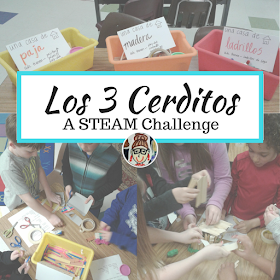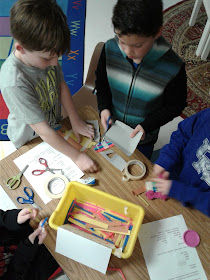I have a brand new curriculum this year and I haven't had as much time to incorporate STEM into my lessons as I've had before but I recently got the chance in third grade.
My third graders recently finished a unit on extreme weather. We practiced counting to 100 and talking about being afraid with Worry Doll Math unit and then we talked about the temperature and extreme weather events like hurricanes, tornadoes, and floods. The following unit in our new district K-5 curriculum just happens to be Me and My Home so I decided to introduce houses with The Three Little Pigs.
First, I told them the story using story props from my favorite site kizworld.com. The students helped act it out and we discussed which pig was smart, which house was strong, and who in the story was mean.
Target Vocabulary:
Vivo en...
una casa de paja, madera, ladrillos
Es fuerte.
Es inteligente.
Es simpático.
Es antipático.
To wrap it all up, the students completed a STEAM challenge. They had to build houses out of straw, wood, and bricks that could withstand a tornado, hurricane, and a flood (tying it back to our previous unit.)
I put them in groups of four and they each had to construct a house of either straw, wood, or bricks. There were not allowed to use any English. They had a sheet with a list of phrases they might use which we went over before starting or they could act something out. The paper included all of the supplies, plus interpersonal phrases like more/less, I like it/I don't like it, Very good/Oh no!, I agree/I don't agree. It's important to remember that the more cognitively challenging the task the less TL students will be able to produce which is why we stuck with easy phrases that they had learned in previous units. If they did use English they were sent to the penalty box for a few minutes.
The straw group had plastic drinking straws cut in half, strips of paper, masking tape, and play-doh. The wood group had wooden craft sticks, masking tape, and play-doh. The bricks group had legos.
I worked it out with my third grade team that I would take their classes for 50 minutes instead of 25 so that we had enough time to build and test their houses. The only English I used was to clarify that to test a house it must have four walls and a roof. Because of our time constraints I didn't worry about a door or a floor. I also explained the English penalty box. Then we flipped the sign back to Spanish and away we went.
I was really impressed at their ability to work together and in Spanish. They didn't resent the penalty box and one class even policed themselves and would put themselves and each other in the box without my direction. After about 25 minutes we tested each house.
I've seen this challenge on Pinterest done with a hair dryer that has ears and eyes to make it resemble a wolf but since I was connecting it back to our severe weather unit we went with a tornado, hurricane, and flood.L
For the tornado it had to stand up under a hair dryer. For a hurricane we used the hair dryer and a spray bottle. The flood was the hardest and only one house passed (and a straw one at that!) We put them down in a tub of water. It passed if no water got up into the house. Even though we had previously looked at pictures of houses on stilts none of the students seemed to remember that as a solution - they kept trying to make them float.
I think next year I will add a reflection sheet or checklist that they can do after in Spanish, but overall, it was a great way to get out some energy the week before Spring Break. I was very happy with how the students used both their creative and collaboration skills along with some basic Spanish phrases.
Other Resources:
Las Casas Increibles - a great website with easy text and pictures of traditional houses around the world.
Los Tres Cerditos Reader - an easy reader my kiddos loved by Speak Up Language Learners on TpT
What do you teach in your house unit? Have you taught Los 3 Cerditos? Share in the comments below!




This is a great idea. We are studying el cerdo with First Grade (Students selected that animal from a bunch of stuffed animals). We talked about its characteristics ( mamífero, omnívoro (come de todo), partes del cuerpo, etc.) and now we are reading Los tres cerditos. I think you gave me the idea to transition from that to the topic of houses and the basic question ¿Dónde vives? Which curriculum do you use as a guide?
ReplyDeleteWe have a district curriculum - http://blogs.fcps.net/curriculum/world-languages/ It's my first year with it and I like it but it's been interesting trying to fit in some of what I used to use. What curriculum do you use?
DeleteGracias por leer el blog!
I don't follow any curriculum in particular. I am building it with my students. I let their interest guide what we do in class. I read a lot so my approach is what I have learned from the research and best practices, that's it. I do keep track of the topic and themes but in general, I follow what some may call non-targeted CI. Anyway, sometimes I feel I need some of the structure that an stablished curriculum may offer. This is a work in progress and I am learning every day from here and there. (It's a joy so far).
Delete